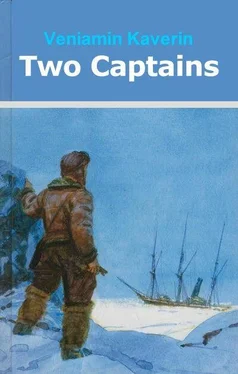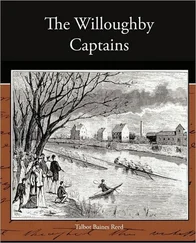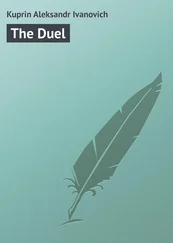It must have been bullets, because chips of wood flew from the hearse and one of them hit me in the face. The carved wooden upright I was gripping for support creaked, shook loose and fell into the roadway as the hearse jolted. I heard Skovorodnikov shouting somewhere behind us, and Aunt Dasha scolding in a tearful voice.
Pulling his cap down lower and twirling his whip over his head, the driver drove the horse straight towards the bridge, as though he couldn't see that the approach to it was blocked with logs, planks and bricks. The horse reared, and stopped dead in its tracks.
Among the men who ran out from behind this barrier I recognised the compositor who had rented a room the previous summer at the fortune-teller's in the next yard to ours. He was carrying a rifle and inside the leather belt, which looked so odd over an ordinary overcoat, he wore a service revolver. They were all armed, some even with swords.
The driver clambered down, hitched up the skirt of Us robe, stuck his whip into his high boot and began to swear.
"What the hell-couldn't you see it's a funeral? You nearly shot my horse!"
"We weren't shooting, you came under the cadets' fire," the compositor said. "And couldn't you see there was a barricade here, you dolt?"
"What's your name?" the driver shouted. "You'll answer for this! Who's going to pay for repairs?" He walked round the hearse, touching the damaged places. "You've smashed one o' the spokes!"
"Fool!" the compositor said again. "Didn't I tell you it wasn't us! Why should we fire on coffins! Fathead!"
"Who are you burying, lad?" an elderly man in a tall fur cap, on which hung a piece of red ribbon in place of a cockade, asked me quietly.
"My mother," I brought out with difficulty.
He took off his cap.
"Quiet there, comrades," he said. "This is a funeral. This boy here is burying his mother. You ought to know better."
They all stared at me. I must have looked pretty wretched because, when everything was patched up and Aunt Dasha, weeping, had caught up with us, and we had driven onto the bridge through the mill, I found in the pocket of my coat two lumps of sugar and a white biscuit.
Tired out, we returned home after the funeral by way of the opposite bank.
There was a glow in the sky over the town: the barracks of the Krasnoyarsk Regiment were on fire. At the pontoon bridge Skovorodnikov hailed a man of his acquaintance who was on point-duty, and they started a long conversation, from which I understood nothing: someone somewhere had pulled up the track, a cavalry corps was making for Petrograd, and the Death Battalion was holding the railway station. The name "Kerensky" kept cropping up all the time with various additions. I could hardly stand on my feet, and Aunt Dasha moaned and sighed.
My sister was asleep when we returned. Without undressing, I sat down next to her on the bed.
I don't know why, but Aunt Dasha did not spend that night with us, the first night we were left alone. She brought me some porridge, but I did not feel like eating, and she put the plate on the window-sill. On the window-sill, not on the table where Mother had lain that morning. That morning. And now it was night. Sanya was sleeping in her bed, in the place where she had been lying with that little wreath on her brow.
I got up and went over to the window. It was dark outside, and a fiery glow hung over the river, where bands of black smoke flared up with yellow streaks and died down.
The barracks were on fire they said, but it was beyond the railway, a long way off and in quite a different direction. I recalled how she had taken my hand, shaking her head and fighting back her tears. Why hadn't I said anything to her? She had so wanted me to say something, even if it was a single word.
I could hear the pebbles rolling up on the shore; the wind had probably risen and it started raining. For a long time, thinking of nothing, I watched the big heavy raindrops rolling down the window-pane, first slowly, then faster and faster.
I dreamt that someone pulled the door open, ran into the room and flung his wet army coat on the floor. It was some time before I realised that this was no dream. It was my stepfather, dashing about the house, pulling off his tunic as he ran. He tugged away at it, gnashing his teeth, but it clung to his back. At last, clad only in his trousers, he rushed over to his box and pulled a haversack out of it.
"Pyotr Ivanich!"
He glanced at me but did not answer. With matted hair, his face glistening with sweat, he was hastily thrusting linen into the haversack from the box. He rolled up a blanket, pressed it down with his knee and strapped it. All the time his mouth worked with vicious fury, and I could see his clenched teeth-the big, long teeth of a wolf.
He put on three shirts and shoved a fourth into his haversack. He must have forgotten that I was not asleep, or he would not have had the nerve to snatch Mother's velvet jacket from the nail on which it hung and thrust it into the haversack along with the rest.
"Pyotr Ivanich!"
"Shut up!" he said, looking up. "Go to hell, all of you!"
He changed his boots and put on his coat, then suddenly noticed the skull and crossbones on the sleeve. With an oath he threw the coat off again and started ripping off the emblem with his teeth. He flung his haversack on his back and was gone-gone out of my life. All that remained were his muddy footmarks of the floor and the empty tin box of Katyk cigarettes in which he kept his studs and ' tiepins.
Everything became clear the next day. The Military Revolutionary Committee proclaimed Soviet power in the town. The Death Battalion and the volunteers who had come out against the Soviets had been defeated.
Chapter Fourteen
WE RUN AWAY. I PRETEND TO BE ASLEEP
Where did Pyotr get the idea that you could travel free now on all the railways? The rumour about free tramcars must have reached him in this exaggerated form.
"Grown-ups have to have official travel papers," he said with assurance. "But we don't need anything."
He was no longer silent. He remonstrated with me, teased me, accused me of cowardice, and sneered. Everything that was happening on Earth, merely went to prove, in his view, that we had to make tracks for Turkestan without a moment's delay. Old Skovorodnikov proclaimed himself a Bolshevik and made Aunt Dasha take down the icons. Pyotr cashed in on this situation by arguing that life in the yard would now be impossible.
I don't know whether he would have succeeded in the end in taking me into the venture had not Aunt Dasha and Skovorodnikov
decided in family council to place Sanya and me into an orphanage. With tears in her eyes Aunt Dasha declared that she would visit us at the orphanage every day, that she would put us in there only for the winter, and we would return for sure in the summer. In the orphanage we would be fed, taught and clothed. They would give us new boots, two shirts each, an overcoat and cap, stockings and drawers. I remember asking her, "What are drawers?"
We knew the orphanage children. They were sickly looking kids in grey jackets and crumpled grey trousers. They were ever so smart at shooting birds with their catapults; they afterwards roasted and ate the birds in their garden. That's how they were fed in the orphanage! Altogether they were a "bad lot", and we had scraps with them, and now I was to become one of them!
I went to Pyotr the same day and told him I was willing. We had very little money-only ten rubles. We sold Mother's boots in the second-hand market for another ten. That made it twenty. With the utmost precautions we removed a blanket from the house; with equal precaution we returned it; nobody had wanted to buy it, though we asked very little for it-four fifty, I believe. That was just the amount we had spent on food as we hawked our blanket round the market. Total: fifteen rubles fifty kopecks.
Читать дальше












